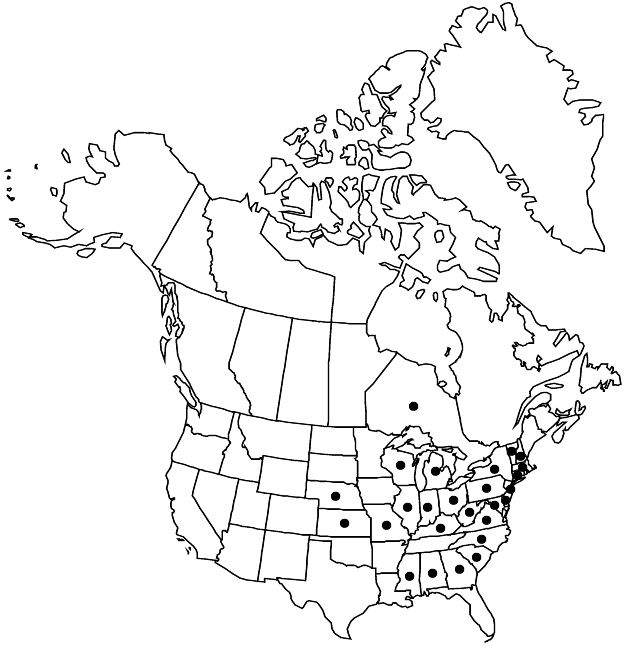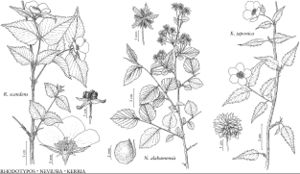Difference between revisions of "Rhodotypos scandens"
Bot. Mag. (Tokyo) 27: 126. 1913.
FNA>Volume Importer |
imported>Volume Importer |
||
| (2 intermediate revisions by 2 users not shown) | |||
| Line 48: | Line 48: | ||
|elevation=0–300 m | |elevation=0–300 m | ||
|distribution=Ont.;Ala.;Conn.;Del.;D.C.;Ga.;Ill.;Ind.;Kans.;Ky.;Mass.;Mich.;Miss.;Mo.;Nebr.;N.H.;N.J.;N.Y.;N.C.;Ohio;Pa.;S.C.;Vt.;Va.;W.Va.;Wis.;Asia (China;Japan;Korea). | |distribution=Ont.;Ala.;Conn.;Del.;D.C.;Ga.;Ill.;Ind.;Kans.;Ky.;Mass.;Mich.;Miss.;Mo.;Nebr.;N.H.;N.J.;N.Y.;N.C.;Ohio;Pa.;S.C.;Vt.;Va.;W.Va.;Wis.;Asia (China;Japan;Korea). | ||
| + | |introduced=true | ||
|discussion=<p><i>Rhodotypos scandens</i> is expected elsewhere in North America. It is widely cultivated in Japan and infrequently in North America and Europe.</p> | |discussion=<p><i>Rhodotypos scandens</i> is expected elsewhere in North America. It is widely cultivated in Japan and infrequently in North America and Europe.</p> | ||
|tables= | |tables= | ||
| Line 72: | Line 73: | ||
|publication year=1913 | |publication year=1913 | ||
|special status=Illustrated;Introduced | |special status=Illustrated;Introduced | ||
| − | |source xml=https:// | + | |source xml=https://bitbucket.org/aafc-mbb/fna-data-curation/src/2e0870ddd59836b60bcf96646a41e87ea5a5943a/coarse_grained_fna_xml/V9/V9_646.xml |
|subfamily=Rosaceae subfam. Amygdaloideae | |subfamily=Rosaceae subfam. Amygdaloideae | ||
|tribe=Rosaceae tribe Kerrieae | |tribe=Rosaceae tribe Kerrieae | ||
Latest revision as of 22:58, 5 November 2020
Stems reddish brown. Leaves: stipules 2–3.5 mm, membranous, margins strongly sericeous; petiole 3–10 mm; blade weakly bicolored, narrowly to broadly ovate, 4.5–7.5(–10) × 2–4(–6.5) cm, base rounded to broadly cuneate, plicate between impressed veins, apex acuminate, abaxial surface more strongly sericeous, hairs 0.1–0.2 mm. Pedicels 6–13 mm (to 30 mm and expanding in fruit). Flowers: epicalyx bractlets linear-lanceolate, leafy, 2.5–5 × 1 mm; sepals 8–15(–18) mm, thickened basally, distally leafy, fimbriate-serrate, acuminate, sericeous-strigose; petals spreading, 17–22 mm, margins entire-erose; stamens in several series mostly at sepal bases, rarely onto torus, filaments white, 4–6 mm, anthers yellow, 0.5–0.7 mm; torus 2–2.5 mm, interior densely sericeous-strigose, exterior glabrous; styles linear. 2n = 18.
Phenology: Flowering Apr–May; fruiting Jun–Sep.
Habitat: Mesic disturbed woods and thickets, especially in suburban areas
Elevation: 0–300 m
Distribution

Introduced; Ont., Ala., Conn., Del., D.C., Ga., Ill., Ind., Kans., Ky., Mass., Mich., Miss., Mo., Nebr., N.H., N.J., N.Y., N.C., Ohio, Pa., S.C., Vt., Va., W.Va., Wis., Asia (China, Japan, Korea).
Discussion
Rhodotypos scandens is expected elsewhere in North America. It is widely cultivated in Japan and infrequently in North America and Europe.
Selected References
None.
